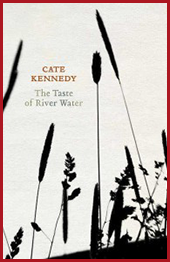Cate Kennedy
ISBN: 9781921844003
I must confess that the description ‘always accessible’ on the front inside jacket of Cate Kennedy’s new and selected poems The Taste of River Water got my hackles up.
It made me think of compromise, of poetic vision marked with footnotes, and mystery sacrificed through dogged meaning. It’s not that I thought poetry should be hard to understand, it’s just that it should be wild and free and grown from a fickle chip of the heart, and not inviting any old somebody in for a cup of tea and a bickie.
That was until I read The Taste of River Water. And it is true that it is accessible. A scan of an online book review site confirms this, with multiple reviewers who ‘don’t normally read poetry’ stating that they thoroughly enjoyed the collection. This may be because modern poetry sometimes prioritises imagery over meaning, and many of Kennedy’s poems read like vignettes stripped back to their guts.
This makes them easier to understand, to enter into. They deal with memory as fragments that interweave, or tape together, in an understanding of life, a ‘spliced symphony of lapses, of truest silences’ (Letter 1); the splicing of story pieces and memories, remembered.
Curiously, it is the poem Knothole, about knocking away the twig to safety of ants swarming from a log in a fire, that really endears Kennedy’s work to me. It is the stab of dark wilfulness of this act that provides a tough edge to the empathy in the rest of the poems. It is the same strength, the willingness not to look away, that allows the reader to experience things without a filter, for what they really are.
In the title poem The taste of river water Kennedy and a companion heavy with an intolerable feeling are braced by the current where ‘nothing here could care less’. So it is that they raise a cupped hand of the river water to drink:
There is no blue plastic seal to crack
no faint, protective antibiotic assurance
this is river water.
In it, taste rain, eucalypt, sun,
the steeped bark of fallen boughs.
Kennedy has the same knack of dissolving boundaries, of seeing what is rather than what should or should not be.
My favourite poem is the mundanely titled 8 x 10 colour enlargements $16.50, a heartbreaking vignette about a woman who missed first place in a rural photo competition with a theme ‘Rural life’ because it showed only her kids looking out a window in wonder. ‘You know… it didn’t break the rules’, she quietly tells Kennedy later, ‘This was the first time my children ever saw rain’. Like the spliced silences, ‘all this passed into silence: / unremarked and unacknowledged, / that’s why I’m telling you now’. The grace and hard working humbleness of the farming family, the sense of urgency in capturing this unremarked moment, is beautifully distilled.
Kennedy is a storyteller and accomplished novelist, her novel The World Beneath won the People’s Choice Award in the NSW Premier’s Literary Awards in 2010, and her poetry is the emotions distilled into an honest performance, one movement to another, laid out in their fragments and pared down to bare bones of the emotional cranks that lead you, when the gears fall away to find yourself in that ‘pure torn open moment’ (Joy flight). Another perfectly executed emotional wrench is October 14th : the Chilean miners are lifted into the light.
The performative quality can niggle, however, and struck a false note for this reviewer in How to play Marineboy and How to eat a guava. Here, the style of directive writing—like cook book recipes—is a bit of fun, but provides a level of separation from the intended, poignant, themes of respectively the bind of time, and embracing the sensuality of life.
Or perhaps my uneasiness is that there is no separation. We are already separated from all these events that live on in our memories, as we recall them, and even as they unfold. How to play Marine boy directs to:
Unwrap a Wrigley’s Spearmint chewing-gum stick,
say: ‘Now I must take an oxytab.’
Chew it, dive to rescue and escape.
This split in this style of writing, this self-consciousness heavy with a nostalgia, performs almost uncomfortably that this moment is passed. And one of the rules in how to play Marine boy, how to be a child, and maybe even how to be an adult, is that in the very moment we are captivated by the urgency of the present, the monumental, ephemeral present, we are setting down the stuff of memories, the significance of which ‘we do not recognise it yet / we do not recognise it.’



Which meters does she favour in it?
Sorry for the lag in response, I’ve only seen this now. That’s an interesting question! The poems are free verse so I don’t believe they have a meter, however the mechanics of poetry are not my strong point so someone else may be able to advise on this.
R